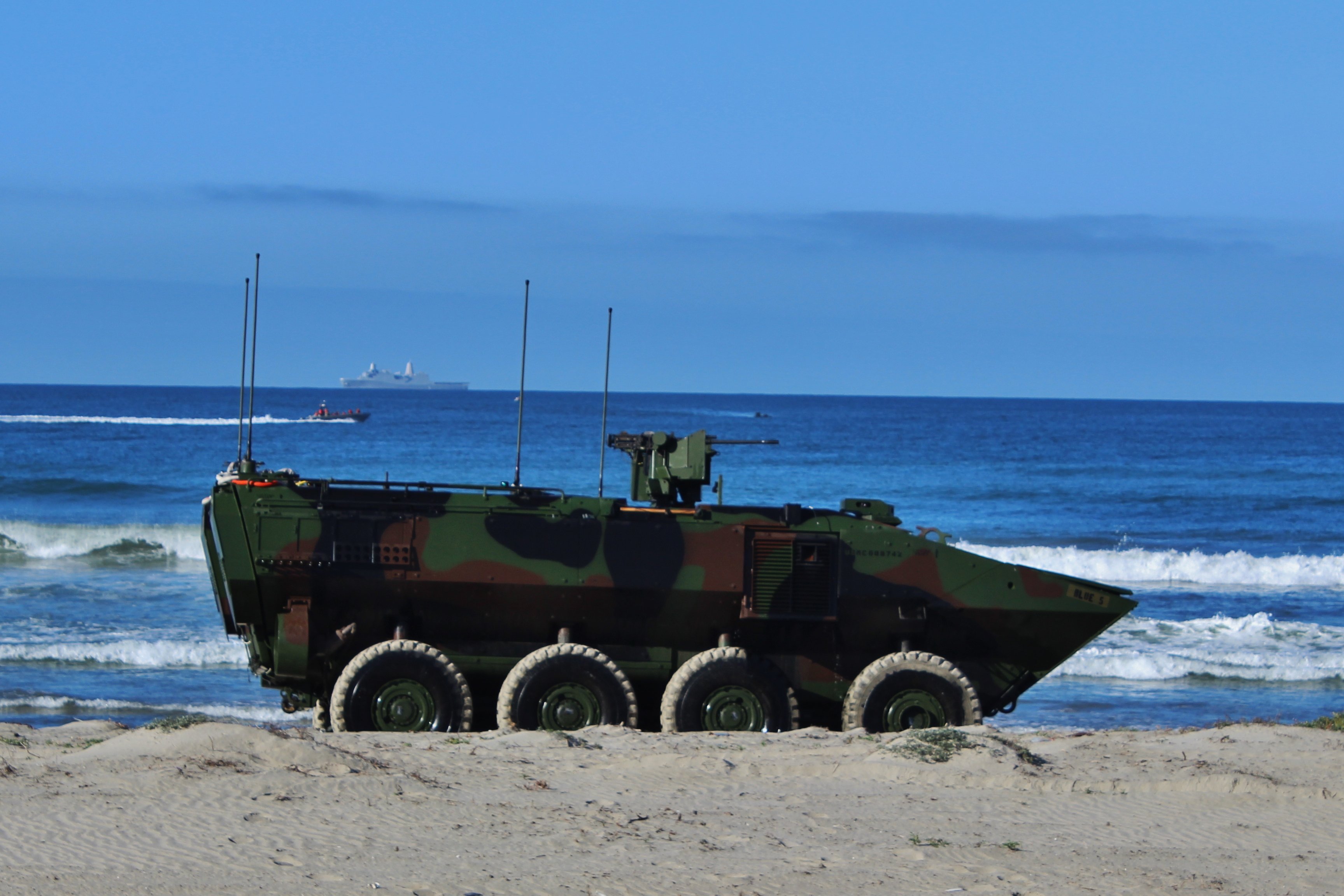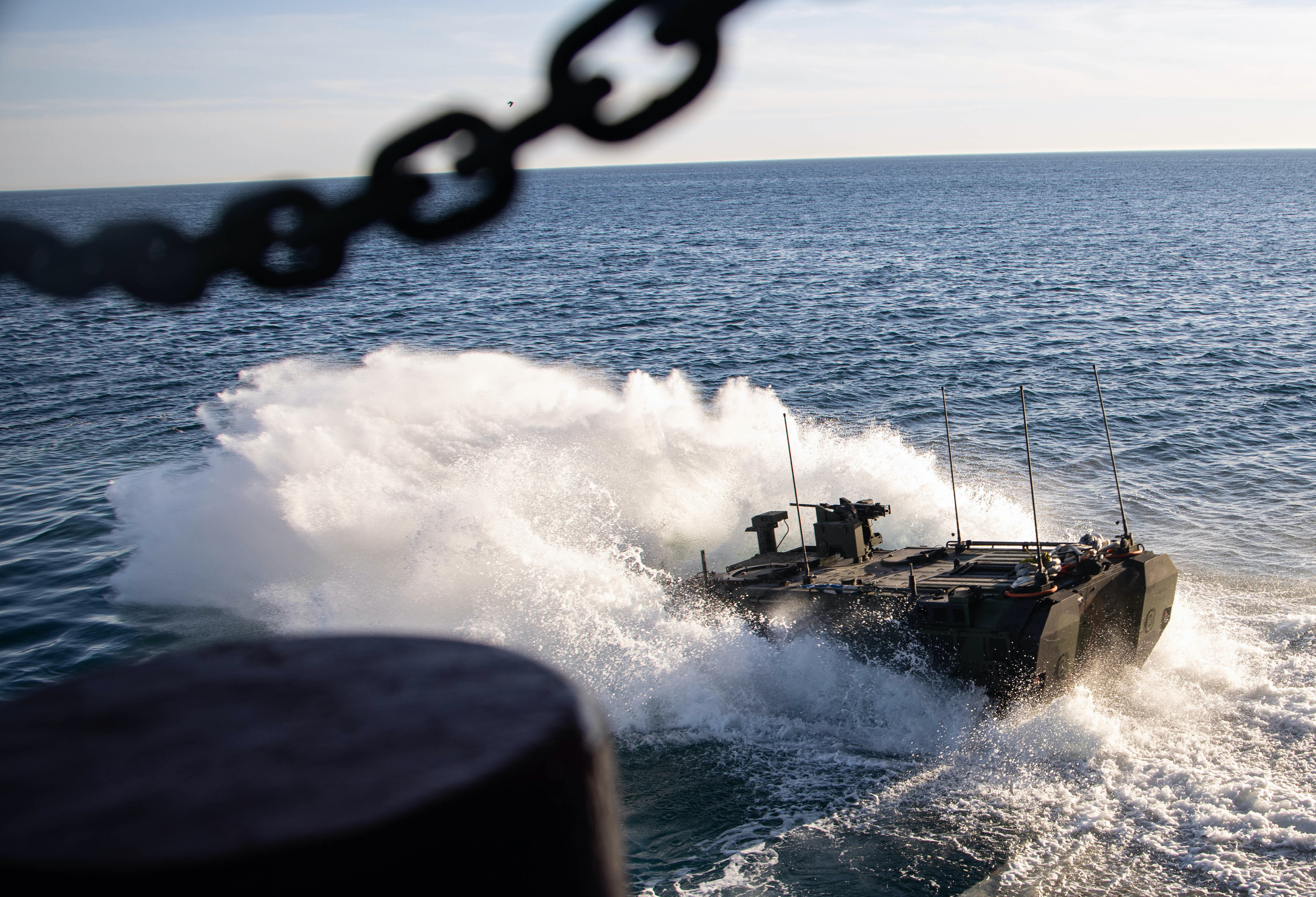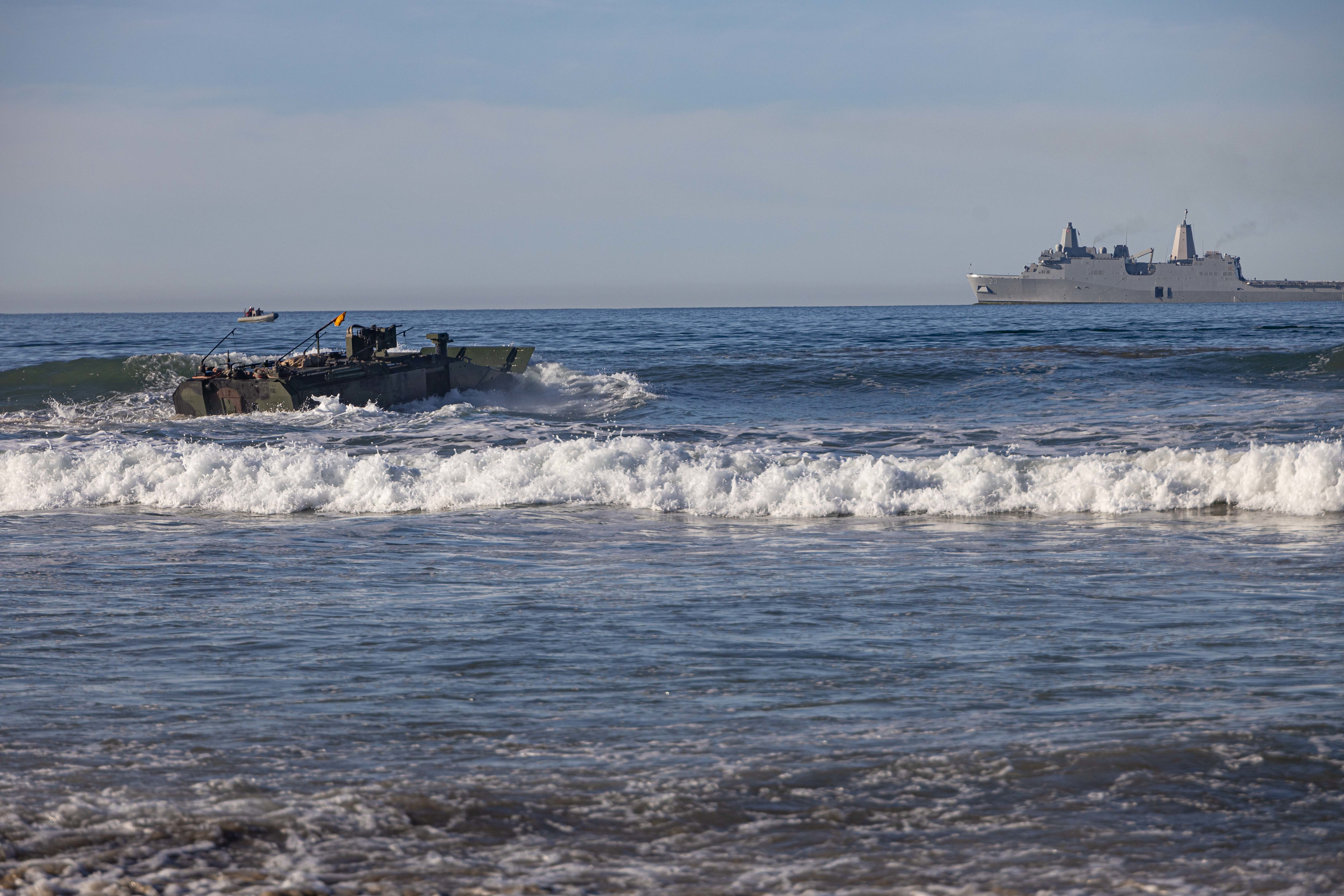
Revamped instruction at a schoolhouse at Camp Pendleton, Calif., will help the Marine Corps better train Marines to operate the new Amphibious Combat Vehicle and prevent more rollover incidents, the service announced Wednesday.
In the wake of several training incidents and delays to the first ACV deployment, the Marine Corps has established a Transition Training Unit at Assault Amphibian School, the schoolhouse where all Amphibious Assault Vehicle and ACV officers, enlisted operators and vehicle repair technicians learn how to operate and maintain the vehicles that can travel at sea and ashore. The ACV is the wheeled vehicle replacing the tracked AAVs that have been a staple of amphibious operations for decades.
A cadre of hand-selected experienced ACV operations and maintenance personnel assigned to the TTU, as it’s known, are “developing a rigorous and standardized program to ensure that Amphibious Combat Vehicle Marines possess the technical knowledge, skills, and proficiency required to safely operate, maintain, supervise and employ the ACV,” the service said in a news release.
“We are clear-eyed about the need to get this right,” Marine Corps Commandant Gen. David Berger said in the release. “Our Marines deserve no less, and our nation depends on it. Amphibious operations, to include the use of ship-to-shore connectors, are a foundational aspect of the Marine Corps. Our Marines will be trained safely and to the highest standard to ensure we remain the Nation’s premier expeditionary force in readiness.”
The move comes amid continued scrutiny of the ACV program and concerns about its safety in the surf zone, particularly following several incidents in July 2022 and October 2022, when the wheeled ACV overturned in the surf while transiting between sea and shore at Marine Corps Base Camp Pendleton. Amid the investigations, the Marine Corps fired the schoolhouse commander in January 2023.
The service has yet to release the findings of the investigations into the 2022 rollovers, but the investigations are completed and are going through a legal redaction review, officials said.
No serious injuries were reported in the incidents, reportedly prompted by mechanical and steering issues that arose while the Marines were driving the ACVs through heavy surf. But these happened two years after a fatal sinking of an AAV during an ocean transit off California’s San Clemente Island in July 2020 that killed eight Marines and a Navy corpsman. Subsequent investigations and legal proceedings raised serious questions about inadequate training, poor adherence to standard operating procedures, ignorance of safety protocols and other failures up and down the chain of command.
The ACV rollovers and mechanical issues have affected planned deployments of the ACV, with the 13th Marine Expeditionary Unit last year and the planned deployment with the 15th MEU this year.
“What we are focused on right now is building experience and expertise with the platform,” Marine Corps officials said in the statement. “As with the fielding of any new system, building this expertise will take time. We are taking a deliberate approach as we field the ACV to the Fleet Marine Force, instituting appropriate safety measures to ensure safe and effective training and to incorporate lessons learned into future training evolutions. It’s important for us to get the training right before we speculate on future deployments.”
The Marine Corps already has fielded 139 ACVs – largely assigned to Amphibian Assault School and I Marine Expeditionary Force units at Camp Pendleton – of the personnel carrier variant known as ACV-P. It’s one of four mission variants the service wants, along with command-and-control (ACV-C), weapon-mounted (ACV-30) and recovery (ACV-R).
ACV Marines to Re-certify

Service officials “identified significant differences between the safe operating procedures of the ACV and its predecessor, the Assault Amphibious Vehicle. Preliminary findings from recent mishap investigations recommended that ACV operators receive more training focused on the internal mechanical systems of the ACV and how the platform differs from the AAV.”
In the transition to the new ACV, the schoolhouse has trained Marines in both the AAV and the ACV but from coursework that’s been largely focused on the AAV. But just how much instruction and training in the ACV and also in the AAV should they get? That’s what the transition unit is getting after, according to the Marine Corps.
Instructors are “consolidating ACV lessons learned and best practices into an updated, continuous skills validation program. Upon program approval, the TTU will evaluate and re-certify ACV operators and maintainers previously trained on the ACV platform,” the Marine Corps in the statement.
“We are developing a program focused on performance-evaluated measurements associated with the safe operation of the ACV both on land and in water,” Col. Howard Hall, the TTU officer-in-charge and a veteran AAV officer and former battalion commander, said in the release. “The exceptional intensity and professionalism exhibited by the Marines of the TTU combined with the coordination and support of leaders at all levels across the Marine Corps is a testament to our commitment to facilitating the ACV transition and leveraging its impressive capabilities. This training will lay the foundation for future Assault Amphibian School and assault amphibian battalion proficiency.”
The unit will develop proficiency evaluation and validation standards, designed to carry through initial and advanced training for ACV operators, maintainers and unit leaders. “It is not enough to put a check in a box when it comes to safe operation and maintenance of the ACV,” Maj. Jim Agostino, TTU’s operations officer and a former AAV company commander, said in the release. “We are looking to certify Marines in the technical operation of the vehicle from each crew station, to ensure they possess the requisite skills of operating the ACV safely and have a firm foundation to enhance their capability in follow-on training.”
New Surf Reports Under Consideration

The 2022 rollovers happened during periods of heavy surf and swells that pushed the vehicles into upper limits of safe operations and raised questions about how the Marines decided it was okay to press through the big seas. The decision to transit between sea and shore is based on water conditions and dependent on a surf zone observation report. The Marine Corps is looking at new technologies to do those calculations and help decision-making.
“We have recognized a gap in the way that the service has historically conducted surf zone observations,” the service said. “The Marine Corps is working to rapidly procure and deploy new surface observation systems. We anticipate the fielding of the program to go through the end of fiscal year 2023.”
Meanwhile, surf zone transits remain suspended. ACVs continue to operate on land and in waters that are open and protected, which at Camp Pendleton is the Del Mar Boat Basin that’s home to the schoolhouse and 3rd Assault Amphibian Battalion.
“The Marine Corps is taking a deliberate and phased approach to authorizing the ACV to transit the surf zone,” the service stated.
Once they are authorized, the TTU staff will “conduct surf zone transits to validate their certification course. Once the course is validated, the service will authorize Marines participating in TTU certification to transit the surf zone,” the Marine Corps said. “Ultimately, the phased approach will conclude with approval for ACV’s to transit the surf zone with embarked Marines. We expect this phased and deliberate process to begin this summer.”





